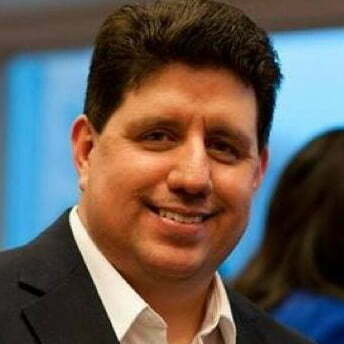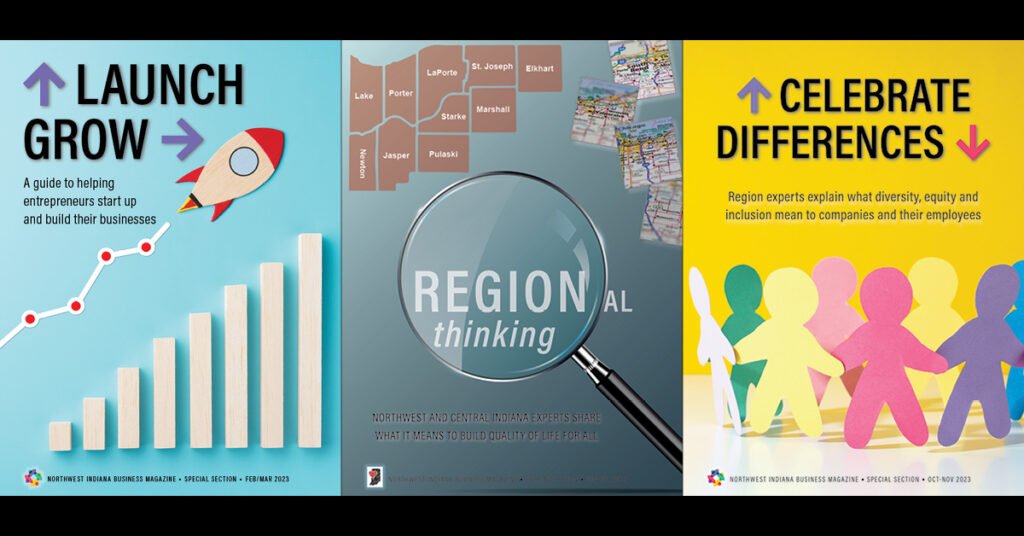In June 2008, after a long, grueling campaign for the Democratic nomination for president, Hillary Clinton finally conceded to Barack Obama. It was a historic moment for the entire nation, but especially for American women.
“Although we weren’t able to shatter that highest, hardest glass ceiling this time, thanks to you, it’s got about 18 million cracks in it,” Clinton said in her concession speech to her supporters.
That glass ceiling incurs cracks nationwide and here in Northwest Indiana because of women who lead in a variety of sectors including business, industry, politics and education, this at a time when more women are leading major companies or owning their own business than ever before.
“I think there is a glass ceiling that we have to work through. But there are many people in positions of power and leadership who have the ability to help change this,” says Danita Johnson Hughes, president and CEO of Edgewater Systems for Balanced Living in Gary.
In 1996, there were more than 6 million women-owned businesses in the United States, according to the National Association of Women Business Owners. Today, that number is nearly 10 million.
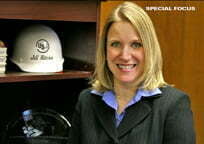
And those aren’t the only numbers. The number of women who lead Fortune 500 companies is up from the last 14 years. In 1996, only one female CEO led a Fortune 500 company, but in 2009, 15 women led Fortune 500 companies, according to a report in USA Today.
Although that number is still not where many women would like to see it, the upward trend holds hope for continued improvement. But in becoming a leader of any size business or organization, what are the traits one needs to have? What pitfalls await those trying to become that leader of the next generation?
For Johnson Hughes, becoming successful meant developing a strong sense of self-confidence, although it didn’t happen overnight.
“Unfortunately, my upbringing didn’t help me to achieve that. The challenges got me off course. I really couldn’t fulfill my dreams. But because I was able to believe in myself, I was able to recapture that,” she says.
Johnson Hughes was born in Gary and grew up there in poverty, watching family and friends die from drugs and gang wars. After dropping out of high school, she had a baby as an unwed teen and was always told she would never amount to anything.
Although at times she believed those negative statements, it wasn’t enough to keep her down. She eventually enrolled in college and went on to earn a doctorate degree from Walden University in Minneapolis.
She’s now dedicated her life to helping others through her books, motivational speaking and the Edgewater Systems for Balanced Living, a behavior health care services center.
“You need to focus and have a good support system with people willing to be on your ‘Dream Team,’” says Johnson Hughes, a Valparaiso resident. “A lot of young people don’t have that but you need that one person who takes an interest in you, causes you to be resilient so you can bounce back from setbacks and failures.”
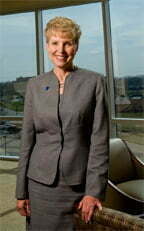
Johnson Hughes says young people need to focus on what they are good at and go after it. There’s also the need to try and eliminate the “toxic” people from your life. “The toxic people are the naysayers, the negative people. Young people call them the haters. Those are the people who are unhappy and they want everyone to be unhappy,” Johnson Hughes says.
Years before she became manager for state and local government affairs in Indiana and Michigan for U.S. Steel Corp., Jill E. Ritchie worked in customer service.
Actually, it was serving up fruit drinks at a mall. “Part of success is looking at everyone like a client or a customer. They have a need. You try to find the best way to provide that need to them,” says Ritchie, a Chesterton resident.
Ten years ago, Ritchie started out as a litigator in U.S. Steel’s internal corporate law department at the company’s headquarters in Pittsburgh. She moved to Northwest Indiana two years ago to work at U.S. Steel’s Gary Works.
Ritchie, a married mother of a 5-year-old daughter, says those looking to climb the corporate ladder need to make decisions. “The opportunities are there. You need to know what you want and know when to ask if you have the ability to achieve it,” Ritchie says. “You have to maintain your integrity, be yourself and work hard.”
From Chicago’s Millennium Park and Soldier Field, to BP’s Whiting Refinery and St. Anthony Memorial Hospital in Michigan City, Tefft Bridge and Iron’s products are used through the metropolitan region. Tefft manufactures and fabricates plate and structural steel products for building structures, trusses and girders, frames, mounting brackets and supports, as well as a variety of custom fabrications.
Part of becoming a leader is showing you’re willing and capable of handling all tasks, says Mary Szymusiak, CEO of Tefft Bridge and Iron in Wheatfield.
“You have to be willing to do any job that there is. There is no job beneath you, from answering phones to getting your hands dirty in the shop,” Szymusiak says. “You have to have experience in every single area. If you’re going to be an owner, you have to get the job done. I don’t know any boss that isn’t willing to do that.”
The company was started 30 years ago as Tri-State Steel by Szymusiak’s husband, Jim.
Mary Szymusiak decided to purchase the company a few years ago after her husband decided to do something else, including helping raise the couple’s three children and tend to their 120-acre farm. She renamed it Tefft in honor of a small town that used to exist near Wheatfield.
But in the years Jim Szymusiak owned the company, the couple worked together to make it a success.
It’s a similar situation Szymusiak’s own parents went through when she was growing up. Her parents owned a construction company, with Szymusiak’s mother serving as her father’s field engineer. “My mom and dad had always worked together,” she says. “I grew up learning how to read a blueprint.”
Szymusiak says for any leader to be successful, communication is the key. She says while there might still be a glass ceiling for women in the workforce, it’s slowly cracking.
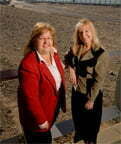
“My parents never talked about a glass ceiling. You can make it happen with hard work and education. With perseverance, there’s no reason to believe there is a glass ceiling. If there is, you take another route to get around it,” Szymusiak says.
Getting people into the right career path is the passion of Linda Woloshansky, president and CEO of Center of Workforce Innovations in Valparaiso. “My position never feels like a job. That’s the advice I always give to young people: Find the thing that is rewarding and carry out your mission in life.”
Woloshansky has 25 years of experience as a CEO of four organizations, including in the private sector, school systems, state government and not-for-profits.
The Center of Workforce Innovations, a not-for-profit agency, brings private-sector leaders together with policymakers from government, education, economic development, labor and community-based organizations to analyze regional labor market trends, needs and issues to develop strategic workforce solutions.
For Woloshansky, planning is the key to success. “Persistence and determination are critical. If you stick with something and you believe in it, you can be successful,” says Woloshansky, an Ogden Dunes resident. “Planning is important. Planning moves into implementation.”
Woloshansky says younger women often do not see the potential for leadership within themselves, which is why having a role model or mentor can play a role in future success.
“My mom was a stay-at-home mom. When I was older, I had some friends who were slightly ahead of me. I watched them, and they encouraged me. They saw the leadership that I didn’t see. That was very encouraging,” Woloshansky says. “What I try to do is encourage others in that way, pointing out their strengths. Maybe they can carry forward. For me it made a world of difference.”
Women having confidence in each other, Woloshansky says, is the only way for women to break that glass ceiling. “It’s incumbent upon women to make sure that it disappears, have confidence and believe in yourself. You can do that by being a change agent.”
As Hillary Clinton was embarking on a historical journey to the White House in 2007, Olga Velazquez was making history of her own. The onetime Portage City Councilwoman decided to give it a go by becoming not only the city’s first female mayor, but the first female mayor in all of Porter County. She won a tough general election in the fall of 2007.
“The position is a big responsibility. I knew that coming in. The volume of work is great and we don’t have a lot of additional people,” Velazquez says, adding that the responsibility of being a mayor is even greater now during a recession. “That poses additional challenges.”
Even in her own path to the mayor’s office, Velazquez says not all accept such a role for a woman. “We just need to keep working and expanding our reach, gaining understanding and gaining credibility,” Velazquez says.
Since taking office, Velazquez has pushed the city toward unprecedented investment, including passage of a $15 million bond to complete a much-needed infrastructure project. Velazquez says she knows that sometimes her decisions aren’t greeted with acceptance or enthusiasm. “But you have to do what’s right for your community.” Despite a tough first two years, Velazquez says she intends to run for a second term.
But Velazquez isn’t the only woman to make political history in Northwest Indiana. In 1999, the world was preparing to welcome in a new millennium with hopes that old attitudes and old ways would be left behind. The city of LaPorte was no different.
“I really felt the community was ready. I really felt confident that they were ready for a woman to serve as mayor,” says Kathy Chroback. “I felt very welcomed and ready to take office.”

With that, Chroback became the first woman chosen to be mayor of LaPorte. She has her mother to thank for years of guidance.
Ironically, it’s probably not a career path Chroback’s mother would have wanted for her. “She didn’t think it was something I should be doing,” Chroback says.
Chroback’s mother worked in LaPorte city government for 32 years, including 12 years as deputy clerk. “She didn’t want me to get involved in politics,” Chroback says of her mother. But she got involved, first joining the LaPorte City Council for two terms.
When she ran, she had to convince a very skeptical city that she could do the job. “I think the pressures on a woman are more than for a man. You have to be more convincing,” Chroback says.
In 2003, Chroback lost her re-election as mayor but came back in 2008 for another shot. “If you’re willing to walk down that path and you’ve never done it before, it is very difficult,” said Chroback, who has a 24-year-old daughter. “You have to work your way into it.”
In her more than 34 years in banking, Carol Highsmith knows what it takes to reach the top. “Certainly,there’s a lot of hard work. You have to be willing to do a variety of things and not be afraid to jump into projects,” says Highsmith, senior partner at Centier Bank, based in Merrillville.
Highsmith oversees a division that includes the departments of education, human resources, security, call center, purchase and property management and ATMs. She also was project manager for Centier Bank’s new multimillion-dollar headquarters in Merrillville.
But when Highsmith got into banking three decades ago, there weren’t many female role models for her to learn from. That didn’t stop her for learning as much as possible and seizing the opportunities that came her way.
About a year after she started as a teller, Highsmith was promoted to a branch manager. As she rose through the ranks, the basic aspect of her job remained simple. “I’ve always liked working with the public,” Highsmith explains.
Today, Highsmith says the place for women in the banking industry has improved. “You’re seeing many women in high levels in banking,” she says.
For those now coming up the ranks, Highsmith says any individual, man or woman, needs to keep all options open. And be open to the concept of being a “lifelong learner.”
“Be flexible. Give yourself the opportunity to learn a lot of different things. Don’t only go in one direction,” Highsmith says. “Be willing to learn and to do whatever it takes. Be a part of the learning process and don’t be afraid to ask questions.”
Jo-Ann Plank’s business is giving people directions, literally. Her company, Hawk Enterprises Inc. of Crown Point, constructs and installs traffic signals and lighting along highways throughout Northwest Indiana and parts of Illinois.
She started her company in 1988 with not much experience. She secured a government contract and quickly took out a $50,000 bank loan to get the job done.
“Every day since it’s been a learning experience. And now, 20 years has passed,” said Plank, president of Hawk Enterprises.
Although the recession has reduced her staff from 120 to about 40, the fact that she’s managed to stay in business is a testament to her experience in knowing to how to sail in rough waters. “I’m blessed to be in business today. It’s because we’ve kept our business tight and secure,” Plank says.
Although she never expected to be the president of her own company now for more than 20 years, Plank, a Lansing, Ill., native, says she’ll never return to working for someone else again.
And learning the hard way, through mistakes and errors, has made her stronger. “We didn’t have any experience. We learned from the ground up,” says Plank, a Crown Point mother of three.
Plank believes her persistence to be successful came from her parents who immigrated to the United States from the Netherlands when she was 3 years old. “My parents were just so happy to be in America. They wanted to live the American dream. My father worked in the mill for 30 years and he made sure all of his kids got to go to college,” Plank says.
As a successful female business owner, Plank says she knows women still face obstacles. But knowing that more women are owning their own business, that’s eventually going to change.
“They say small businesses are the backbone of America. A lot of those small businesses are owned by women, so it has to change,” Plank says.
Kathy Guajardo is helping to groom the next generation of leaders in St. Joseph County. As executive director of South Bend’s Head Start program, she and her staff care for some 1,100 children, from 6 weeks old up to 12 years of age, many living in poverty.
Dealing with so many children may seem daunting to some, but not to Guajardo. “They energize me. They are so full of hope. I think the next generation is really going to surprise us,” says Guajardo, who lives in Hobart.
Now in her fourth year, Guajardo says overcoming self doubt is something many people, including women, must do.
“You have to step back and do some reflection,” says Guajardo, who manages her program with a $7 million grant.
While the environment for women is better, Guajardo says she believes women still have a ways to go. One key for being successful, the married mother of three says, is enjoying what you do for a living. “Every day when I come to work, I love what I do. It’s the joy of my life.”
Self-doubt. Unsure. Apprehensive. These aren’t words you can use to describe Virginia Calvin.
“I never doubted that I would be successful,” says Calvin, chancellor of Ivy Tech Community College in South Bend. “I never doubted that I would be a great classroom teacher. I was going to put in the time and effort and make sure the time was well done.”
Born in Louisiana, Calvin says her parents valued education. “Education was the key to any success,” she says. “People who are successful without an education are few and far between.”
After graduating from Texas Woman’s University, she eventually married. “I married a gentleman who wanted me to work and wanted me to be successful. He has been married to a woman who has never wanted to stay home,” she says.
The 64-year-old Calvin has been chancellor at Ivy Tech Community College in South Bend for the last 10 years. Although the school is dominated by young people, Calvin marvels at senior citizens who attend the campus to keep on learning.
“There was an 88-year-old woman who was taking a class. I asked her, ‘Why are you here at Ivy Tech?’ She said she wanted to learn how to e-mail her grandchildren and great-grandchildren. That’s why I say you have to be forever learning,” Calvin says.
Whether it be president or corporate president, Calvin says it will happen one day. “There are glass ceilings broken daily,” she says.
While all of the above women have things in common such as education, perseverance and a wherewithal not to give up, another trait they all share is intelligence.
There is simply no way around it. You have to be smart to get to and hold onto these positions.
It’s no different for Barbara Greene, president of Franciscan Physicians Hospital in Munster.
“Intelligence; you have to have some brains,” Greene says. “You also must be willing to work hard, have character and integrity and a desire to push yourself to do your best.”
The hospital is a for-profit venture that’s part of the Sisters of St. Francis Health Service system. It opened in April 2007. Greene has held leadership positions for more than 20 years with the health system.
She credits her mother with providing the basis to become successful. “My mom was not a professional woman but she was strong, hard working. She pushed us to do our best,” says Greene, a mother of three. She says the pressures of being a leader, whether male or female, can be great.
It’s hard to imagine a glass ceiling standing in the way of Greene, but those obstacles are crumbling for her and women nationwide, she says. “There is a glass ceiling but it’s getting softer.”



